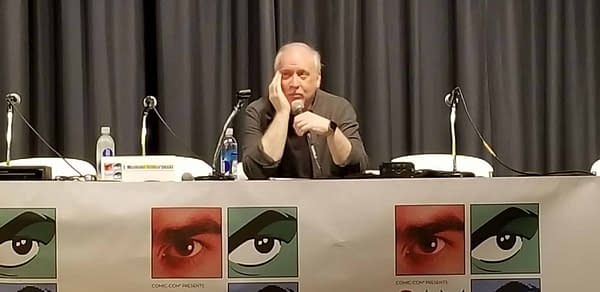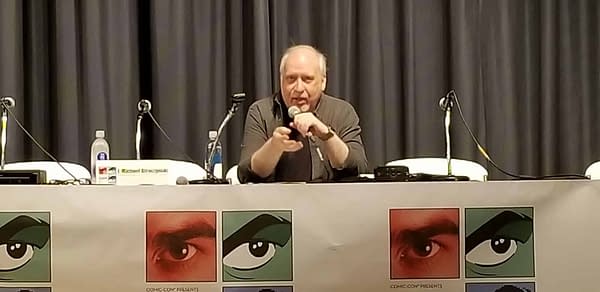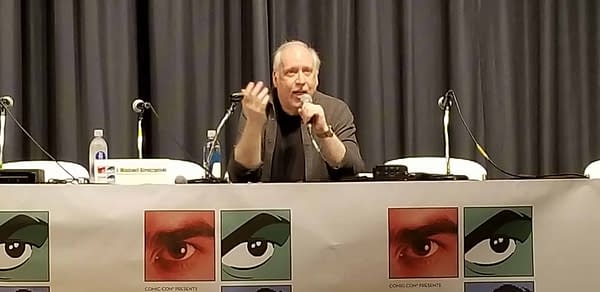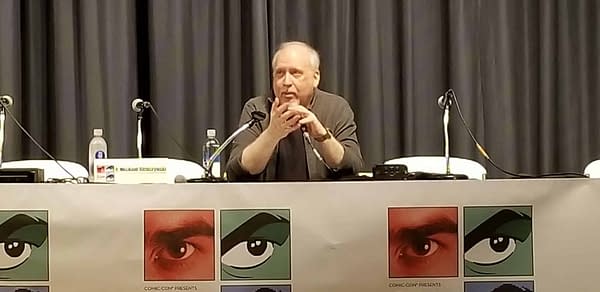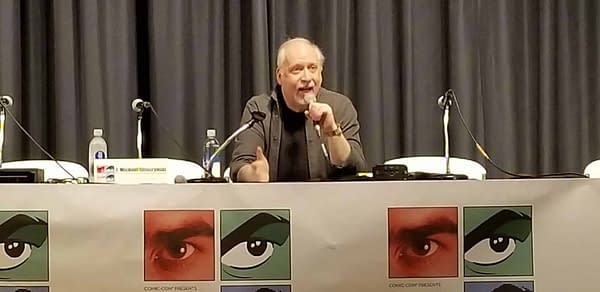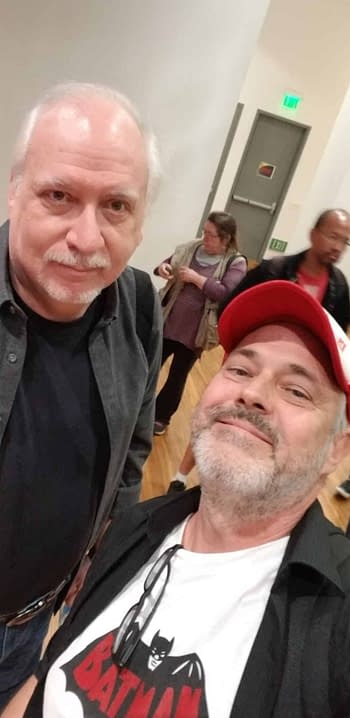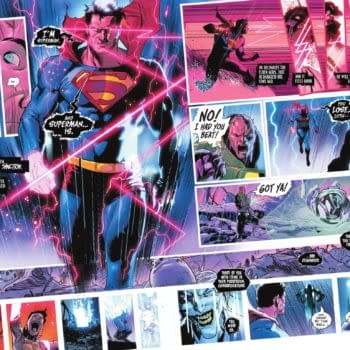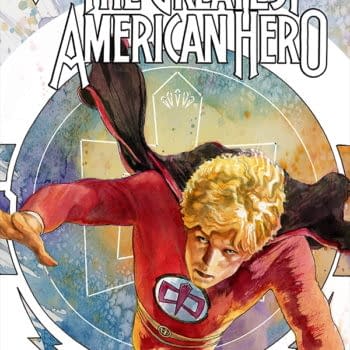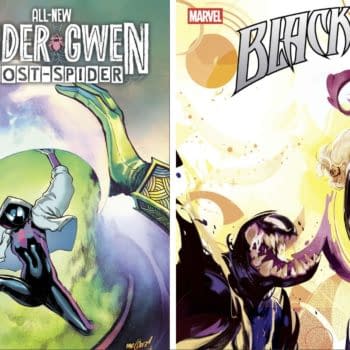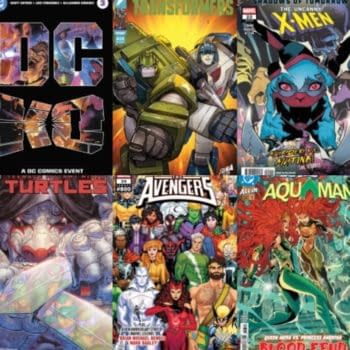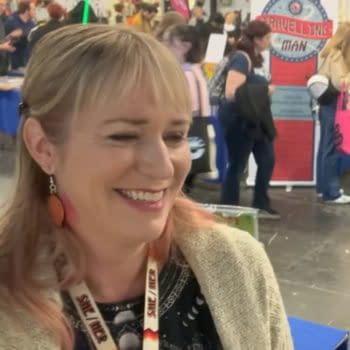Posted in: Comics | Tagged:
Four Takeaways from J. Michael Straczynski at San Diego's SAM 2018
Jimmy Leszczynski wrote from SAM – Storytelling Across Media – in San Diego last week.
As the sun gets heavy in the west, I head to the final panel of the day for the Storytelling Across Media convention in San Diego. An event which has turned out to be a symposium on writing for beginners and professionals alike, and a chance for hardcore fans to meet and chat with their heroes. SAM has so far been chock- filled with tons of great advice and inspiration from some of the biggest names in the comics industry, and The Prince from a Distant Land Scenario panel will be no exception. Ladies and Gentlemen, an industry icon with over 40 years in the business- J. Michael Straczynski.
10 years is about the average career span of a television writer in Hollywood. There are some writers, however, who have been able to extend that much further. The secret to this longevity -how to keep the work fresh, the career intact, and maintain relevance- comes down to the very heart of this conference- storytelling across various media.
Michael starts by joking that they put him on last today for a reason. "Usually about 30 minutes into my talks people start leaving for the parking lots, and they want to clear the room early." Over the laughs of the audience he then asks if we are all enjoying the weekend so far, to which the crowd responds with an enthusiastic "Yes!"
"Well, that stops now." he continues over the chucking crowd and promises "This will either be the stupidest panel you have attended this weekend, or the most helpful, or both."
Writing across media is very important to Straczynski, and he aims to pull all the concepts from the weekend into making a living or even a career as a writer, able to transition across media. In an attempt to do just that he reaches into his bag of anecdotes from his own career to begin.
There is nothing more tedious than listening to a writer talk about how he became a writer, but he continues with his early education and career. He tells us that he considers himself a bit of a San Diegan- graduated from Chula Vista High School, went to Southwestern Collage, and San Diego State. Growing up on Sci Fi and fantasy novels he always knew he was going to be a writer. This led to a career spanning 4 decades starting as a journalist for the L.A. Times, People, and Writer's Digest, than writing for animated hits He-Man and The Real Ghostbusters, which brought him to creating live action television shows such as Babylon 5, and Sense8, and writing the movies Changeling, Thor, and World War Z.
Michael drops the first Big Takeaway of the panel early in his story. After almost 5 years of not selling anything, his family and friend started suggesting maybe giving up on his passion. "This one one of the most horrific things that those that love us do to us. Where they say, 'OK. you want to be a writer or artist or musician, or Actor, or whatever it is- give it 3 years. Give or take. If you don't make it by then, think about something else.' What they don't understand is that those professions are arts in a way that other things are not." He pauses, and continues.
"You can graduate carpentry school a carpenter, you don't graduate art school DaVinci. You don't graduate musical school Mozart. So to put the pressure on us saying 'Give it "X" years and then give it up.' Leads people to stop the process of learning their craft just when they are getting good at it."
The second Big Takeaway of the panel is presented in what Straczynski refers to as his "3 Legged Stool Theory"
"If you walk out of here with anything here today, this will be the life saver." He tells us as he emphasizes that it's important for any writer that wants to have a successful career, not write just one thing. You must at all times have 3 sources of revenue, because at some point one of those legs be kicked out and you can lean back on the other 2, While you are waiting for the other leg to come back again. Articles, animation, radio, then movies, comics, TV. He always had 3, he states. Not only is it financially important to work across media, but creatively, everything feeds into everything else. If you know how to write a good article, the structure of an article informs you how to write a short story. If you can write a short story, work within a very confined space of what that short story is, you can probably write a one act play or a play which is in a confined space, in 3 dimensions, on stage. If you can write a play, which contains dialogue, you can use it in a TV script. TV scripts tend to be 47 60 pages in length, which prepares you to write a novel or a movie. Everything feeds into everything else, and it keeps you constantly fresh,
"All writing is good writing. Pushing yourself beyond your comfort zone to work in multiple areas makes you fearless. That's the one thing you can never ever do is to be afraid to try something new, or you will live in a box and never know what happens next. The key centerpiece tof my entire career, which is to keep shining myself." Straczynski tells us about the television writers he met in L.A. when he first arrived, and how they were unable or unwilling to adapt.
"They all lost their careers in television. They all took the position that 'this is the kind of writer I am, these are the kind of stories I write.' and watched as they were unable or unwilling to adapt to different media. "They lived in a box, and they died in a box, because that's what boxes are for."
The third Big Takeaway from the panel comes to us after Straczynski came back to LA, after show running Jeremiah, and was considered box office poison. He was still doing comics and small stuff on TV but mostly his career was over. 3 years later he took a chance and wrote a script which Ron Howard loved and had to make. That movie was Changeling and made him box office gold again-overnight.
"The point is that everything that I ended up making a living at, were things that loved, but never thought I could make a living at. Every time I jumped media, suddenly things worked out. Everyone in this room, if you are capable of telling a story, that story can be translated into any form you chose. A story is a story is a story. The margins may vary, or the technical aspects my vary, the language or the techniques may vary. But, at the core of it, if the story is there, all those things are malleable. All those things can be adjusted. Everything you finish you aquire a tool that lets you write the next thing better. Even tho the first thing sucked. The more tools you acquire, the more options you have, more flexibility to make a living the better you become as a writer."
Michael tells the crowd that he attributes his success to "Pig headed stubborness" and that he has always believed this was his destiny. He would have rather crashed and burned and died then walked away. "If all writing is rewriting, then careering is re- careering." He tells us, "There is becoming a writer and staying a writer. Becoming a writer is easy, that's nothing. Staying a writer is ridiculously hard."
It is during the Q&A portion of the show that the fourth Big Takeaway is revealed by way of a recommended writing exercise
"I used to take short stories and scripts that are done by people that are better than I am and retype them. I wanted to feel the subconscious choices that they made while they were writing. They are often invisible in the finished product, but you can see how they got to that point. Within a good script can teach you techniques and ways of doing things that you will have never gotten to on your own. How to do a montage, or how you can segway from one scene to another. Those are very helpful to read. The bad ones are helpful to read too because you realise that the things that don't work, in your own work, may not be visible to you, but when this guy over here screws up it is pretty obvious. You can learn almost as much from a bad script as you can a good script."
This, I believe, is incredibly great advice from an incredibly great writer, and here we are getting it for free.
Straczynski's autobiography Becoming Superman is coming out next July from Harpercollins, and he tells us, "It's about secrets of our family I was never allowed to talk about. And, just the horror of growing up with an alcoholic, violent father, and my mother tried to kill me twice, and an Eastern European background that was horrific on every possible level. The purpose of the book is not that far from what we are doing here today. My point of view is look, I am not the best speaker in the world, I am not the best-lookingperson in the world. But if I can do this, because the words were there, than anybody can do this. And that is the message I want to carry. It's possible. Not that it's gonna happen, just that it's possible. When people think that something is impossible they tend not to do them."
You can follow J. Michael Straczynski on Twitter. His autobiography, Becoming Superman, debuts July 28, 2019 from HarperCollins Voyager.


